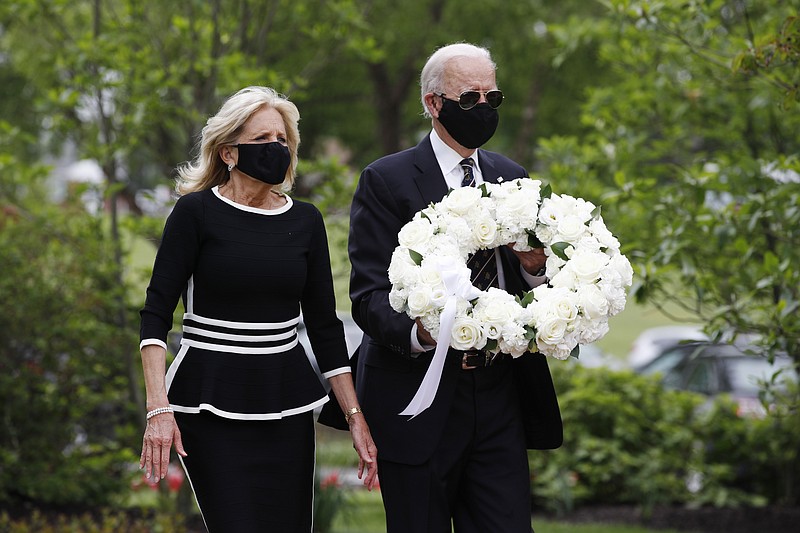Black voters have an interesting dilemma in considering for whom to vote in November's presidential election.
They can go with the candidate of the Democratic Party for whom they vote more than 90% of the time, the man the party says they must not abandon, no matter his track record, his past appreciation for party segregationists or his pronouncement last Friday that any member of their race who votes to re-elect the president "ain't black."
Or they can go with the man Democrats blindingly call racist but whose Republican Party policies lowered their unemployment rate to record levels, who backed and got prison reform passed by Congress, and who engineered record money for historically black colleges.
It's a conundrum because it's a choice between continuing to vote for a party an increasing number of prominent black Americans say has never fulfilled the promises made for them or not being seen as part of a bloc vote critical to the party's success.
Without meaning to, presumed Democratic Party presidential nominee Joe Biden shoved the long assumed vote in black voters' faces Friday with his remarks on a radio show.
"If you have a problem figuring out whether you're for me or [Donald] Trump, then you ain't black," he said.
The statement said everything Democrats have always said to themselves and out of the ears of the public - just keep making promises because blacks will never abandon us.
Biden's statement - insinuating that being black means voting for one party - ought to have been an insult to every voter.
In a short time, either he or his handlers realized his mistake.
When criticisms began to pile up, the vice president - who served under the country's first black president - said his words were "too cavalier" and that he "shouldn't have been such a wise guy."
It's in moments like those, though, when you hear rare honesty. It's similar to 2016 Democratic presidential nominee Hillary Clinton's "basket of deplorables" comment.
"You know, to just be grossly generalistic, you could put half of Trump's supporters into what I call the basket of deplorables. Right?" Clinton said at a New York fundraiser. "The racist, sexist, homophobic, xenophobic, Islamaphobic - you name it."
The candidate's half-hearted apology - "I regret saying 'half'" - left voters wondering whether she really meant all of Trump's supporters were "deplorable" and drove them further into his camp.
Whether Biden's latest gaffe will have legs with black voters in particular is hard to gauge, but it's hardly his first difficulty with them.
Trump-hating New York Times columnist Charles Blow put the matter into perspective over the weekend, saying the longtime Delaware senator has frequently misrepresented "his relationship with the black community," including having "repeatedly lied about marching in the civil rights movement [and] that he was arrested in South Africa trying to see the imprisoned apartheid leader Nelson Mandela."
But his troubles also include his supposed mistreatment of black witness Anita Hill during the U.S. Supreme Court confirmation hearings of Clarence Thomas in 1988, his authorship of the 1994 crime bill that critics say targeted blacks, his warm comments in Democratic debates last year about working in the past with segregationist Democratic senators and his 1970s opposition to school busing to achieve racial balance.
A 1987 Philadelphia Inquirer story also reported Biden had bragged about receiving an award from segregationist Democratic Alabama Gov. George Wallace and reminded Alabama voters during a speech in his first run for president that "we [Delawareans] were on the South's side in the Civil War."
Now, given his latest comments, Biden is getting pressure to put a black women on the Democratic ticket with him. Having already promised to give the spot to a woman, he is being reminded that black U.S. Rep. James Clyburn, D-South Carolina, roused the Palmetto State to get behind him during the presidential primary in late February when the chances for his nomination were slipping away.
Unfortunately, the three black women mentioned most prominently, U.S. Sen. Kamala Harris, D-California, former Georgia gubernatorial candidate Stacey Abrams and U.S. Rep. Val Demings, D-Florida, are either too risky, too ambitious or too unknown.
So, Biden has a black problem, but the question is whether it is a significant problem. If they're in a mood like voters were in 2016 of picking the better of two poor choices, they may go with Biden, who simply is not Trump and not the man in charge when coronavirus stay-at-home orders skyrocketed unemployment. Or, if black voters consider Biden's record, his insulting comments and the Democratic Party's unfulfilled promises, and if they are tired of being told how they should vote, some may choose Trump, who at least was able to accomplish some things for them before the virus became all consuming.
